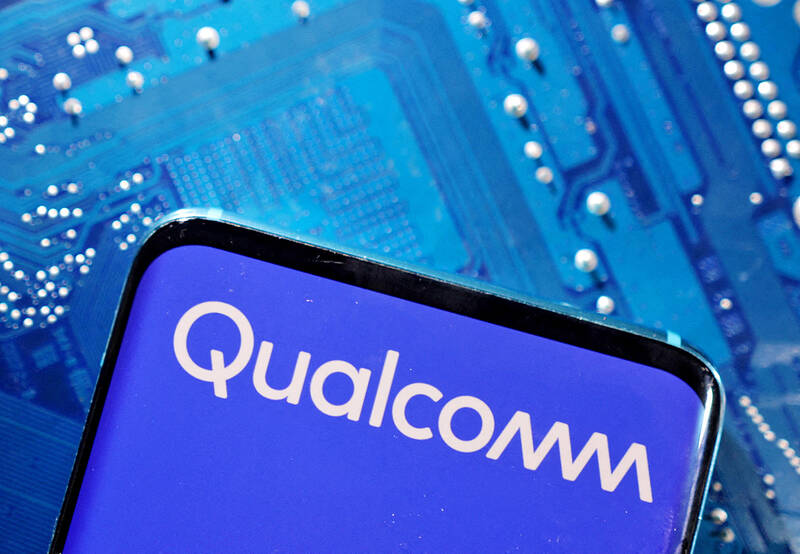Qualcomm Inc, the world’s biggest seller of smartphone processors, gave an upbeat forecast for sales and profit in the current period, suggesting demand for handsets is increasing after a two-year slump.
Revenue in the three months ended in June will be US$8.8 billion to US$9.6 billion, the company said in a statement Wednesday. Excluding certain items, earnings will be US$2.15 to US$2.35 a share. Analysts had projected sales of US$9.08 billion and earnings of US$2.16 a share.
The outlook signals that the smartphone market has begun to bounce back, tracking with Qualcomm’s forecast that demand would gradually recover this year. The San Diego-based company also reported better-than-predicted results in the January-to-March quarter — buoyed by headway in China, where it sells technology to local phone manufacturers.

Photo: Reuters
In the March quarter, profit was US$2.44 a share, excluding some items. Revenue rose 1 percent to US$9.39 billion. Analysts had estimated profit of US$2.32 and sales of US$9.32 billion.
Revenue from the smartphone segment gained 1 percent last quarter, a slowdown from the 16 percent increase in the previous three months.
But China was a bright spot, as sales to phone makers in that country, the biggest market for the devices, surged 40 percent in the first half of the fiscal year, “reflecting our strong competitive positioning and recovery of demand,” the company said.
In that market, Qualcomm chief executive officer Cristiano Amon said customers, including Xiaomi Corp (小米), Honor Terminal Co (榮耀), OnePlus Technology Co (萬普拉斯科技), Oppo and Vivo Communication Technology Co (維沃), are fueling demand. They’re not losing smartphone market share to a resurgent Huawei Technologies Co (華為) in China, he added.
Amon said that Huawei’s reentry into the market has helped stoke interest in the Android operating system, which is often paired with Qualcomm chips.
“We have not seen signs of weakness in the Android premium market in China,” he said.
Huawei has been blacklisted by the US government, and Amon pointed out that Qualcomm only sells less-advanced 4G phone parts to the company — in line with US trade restrictions. His company expects that business to wind down to nothing next year.
Apple Inc and Samsung Electronics Co are major phone customers of Qualcomm. But Apple’s iPhone relies on Qualcomm for connectivity chips, rather than the main processor.
Qualcomm’s Internet of Things group, which creates electronics for Web-connected appliances, has suffered from a glut of inventory. Revenue at that unit was down 11 percent last quarter. Qualcomm’s automotive sales rose 35 percent.
An additional portion of Qualcomm’s profit comes from licensing the fundamental technology that underpins all modern mobile networks. Phone manufacturers pay these fees whether they use Qualcomm-branded chips or not.

Vincent Wei led fellow Singaporean farmers around an empty Malaysian plot, laying out plans for a greenhouse and rows of leafy vegetables. What he pitched was not just space for crops, but a lifeline for growers struggling to make ends meet in a city-state with high prices and little vacant land. The future agriculture hub is part of a joint special economic zone launched last year by the two neighbors, expected to cost US$123 million and produce 10,000 tonnes of fresh produce annually. It is attracting Singaporean farmers with promises of cheaper land, labor and energy just over the border.

US actor Matthew McConaughey has filed recordings of his image and voice with US patent authorities to protect them from unauthorized usage by artificial intelligence (AI) platforms, a representative said earlier this week. Several video clips and audio recordings were registered by the commercial arm of the Just Keep Livin’ Foundation, a non-profit created by the Oscar-winning actor and his wife, Camila, according to the US Patent and Trademark Office database. Many artists are increasingly concerned about the uncontrolled use of their image via generative AI since the rollout of ChatGPT and other AI-powered tools. Several US states have adopted

A proposed billionaires’ tax in California has ignited a political uproar in Silicon Valley, with tech titans threatening to leave the state while California Governor Gavin Newsom of the Democratic Party maneuvers to defeat a levy that he fears would lead to an exodus of wealth. A technology mecca, California has more billionaires than any other US state — a few hundred, by some estimates. About half its personal income tax revenue, a financial backbone in the nearly US$350 billion budget, comes from the top 1 percent of earners. A large healthcare union is attempting to place a proposal before

KEEPING UP: The acquisition of a cleanroom in Taiwan would enable Micron to increase production in a market where demand continues to outpace supply, a Micron official said Micron Technology Inc has signed a letter of intent to buy a fabrication site in Taiwan from Powerchip Semiconductor Manufacturing Corp (力積電) for US$1.8 billion to expand its production of memory chips. Micron would take control of the P5 site in Miaoli County’s Tongluo Township (銅鑼) and plans to ramp up DRAM production in phases after the transaction closes in the second quarter, the company said in a statement on Saturday. The acquisition includes an existing 12 inch fab cleanroom of 27,871m2 and would further position Micron to address growing global demand for memory solutions, the company said. Micron expects the transaction to